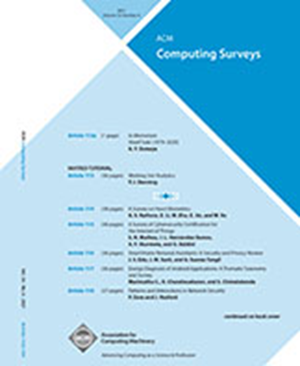A Survey of Source Code Representations for Machine Learning-Based Cybersecurity Tasks
IF 23.8
1区 计算机科学
Q1 COMPUTER SCIENCE, THEORY & METHODS
引用次数: 0
Abstract
Machine learning techniques for cybersecurity-related software engineering tasks are becoming increasingly popular. The representation of source code is a key portion of the technique that can impact the way the model is able to learn the features of the source code. With an increasing number of these techniques being developed, it is valuable to see the current state of the field to better understand what exists and what’s not there yet. This paper presents a study of these existing ML-based approaches and demonstrates what type of representations were used for different cybersecurity tasks and programming languages. Additionally, we study what types of models are used with different representations. We have found that graph-based representations are the most popular category of representation, and Tokenizers and Abstract Syntax Trees (ASTs) are the two most popular representations overall (求助全文
约1分钟内获得全文
求助全文
来源期刊

ACM Computing Surveys
工程技术-计算机:理论方法
CiteScore
33.20
自引率
0.60%
发文量
372
审稿时长
12 months
期刊介绍:
ACM Computing Surveys is an academic journal that focuses on publishing surveys and tutorials on various areas of computing research and practice. The journal aims to provide comprehensive and easily understandable articles that guide readers through the literature and help them understand topics outside their specialties. In terms of impact, CSUR has a high reputation with a 2022 Impact Factor of 16.6. It is ranked 3rd out of 111 journals in the field of Computer Science Theory & Methods.
ACM Computing Surveys is indexed and abstracted in various services, including AI2 Semantic Scholar, Baidu, Clarivate/ISI: JCR, CNKI, DeepDyve, DTU, EBSCO: EDS/HOST, and IET Inspec, among others.
 求助内容:
求助内容: 应助结果提醒方式:
应助结果提醒方式:


